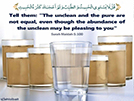Chapter 3-The Statutes Of Mut'a
- Details
- Hits: 4829
Chapter 3
The Statutes Of Mut'a
--------------------------------------------------------------------------------
Conditions In The Contract
IT IS permissible for one or more conditions to be mentioned in the contract of mut'a, so long as they are legitimate. A condition must be accompanied by a declaration and an acceptance. Fulfilling the condition then becomes necessary, since it is part of the contract,
As for conditions not mentioned in the text of the contract itself, but stated before or after the contract, their fulfillment is not obligatory. Concerning this point both al-Shaykh al-Ansari and al Tabataba'i claim a consensus of the ulama. [1] A number of hadith are mentioned in this connection, among them these words of the Imam Ja'far: ' Any condition before the marriage is destroyed by the marriage, but what is after the marriage is permissible.' [2] Here by 'after the marriage' is meant immediately after the words of the woman: 'I have married myself to thee.' Hence, the condition enters into the declaration and becomes a necessary condition of the marriage. ' After the marriage' does not signify after the acceptance by the man. The Imam's words 'permissible' here are usually interpreted to mean 'incumbent'. [3]
It is permissible for the contract to stipulate as a condition a particular time for meetings between the husband and wife, such as daytime or night-time. As already mentioned, it is also permissible for a given number of sexual acts for a given period to be stipulated, as for example, during one day or over the whole period of the marriage. These are legitimate conditions and in no way contradict the requirements of the contract. As the Prophet said: 'The believers hold fast to their conditions [which they stipulate].' However, if only a given number of sexual acts is stipulated without mention of a time period, the contract is invalid, since the time period must be stated. [4]
It is permissible for a condition to be stipulated that the marriage not be consummated, since again the condition is legitimate and does not contradict the requirements of the contract. [5] In addition, the Imam Ja'far was asked explicitly if such a condition was permissible. He replied: 'The man has to fulfill the stated conditions.' [6] However, according to the most widely held opinion, in such a case if the woman should give permission for intercourse during the time period, intercourse is then permissible. For the contract warrants intercourse, but if the condition of non-intercourse is laid down, that is the woman's right over the man. In other words, she has been 'rented' for the purpose of sexual intercourse, and the condition has become the barrier to this end. So if she chooses to waive the condition, she is then at the man's disposal. [7]
Coitus Interruptus
It is permissible to perform coitus interruptus, even if it is not mentioned as a condition in the contract. Al-Shahid al-Awwal and al Tabataba'i claim a consensus of the ulama' on this point. [8] They say the consensus derives from a hadith reported from the Imam Ja'far: 'That [semen] belongs to the man: he may expend it as he wishes.' [9] In addition, in contrast to permanent marriage, the basic aim of mut'a is enjoyment, not the production of offspring. [10]
If the woman becomes pregnant such that the pregnancy derives from the period of mut'a, the child belongs to the husband, even if he performed coitus interruptus. This statute applies to every legitimate act of sexual intercourse, not specifically to mut'a, since the principle enunciated in the saying: 'The child belongs to the bed' is of general application. [11] Al-Shaykh Muhammad al-Hasan claims consensus on this point. [12]
However, if the man should deny the child, then it does not belong to him; the 'sworn allegation' required in permanent marriage is not necessary. Al-Shahid al Thani, al-Shaykh al-Ansari and al-Shaykh Muhammad al-Hasan claim consensus on this question. They point out that the 'bed of mut'a', like the 'bed of a slave-girl', does not hold the same high position as the bed of a permanent wife, since a wife by mut'a is a 'rented woman'. [13] On this point two hadith have been recorded. [14]
Al-Shahid al Thani adds that although sworn allegation is unnecessary in mut'a, this is the outward and exoteric statute, and there is another 'statute' established between man and God. In this second respect it is not permissible for the man to deny the child just because he performed coitus interruptus or suspects his wife of adultery. He must have definite knowledge that the child does not belong to him. Hence it is encumbent upon him to observe what exists between him and God, even though his word alone will be accepted and there is no need for him to make a sworn allegation. [15]
Divorce
By a consensus of the ulama there is no divorce in mut'a. [16] The man and woman become separated from each other through the expiration of the time period, or else by the man's 'returning' the remaining time to the woman. In this connection a saying of the Imam Ja'far is as explicit as possible. He was asked if the husband and wife married by mut'a become separated without divorce. He replied: 'Yes. ' [17]
Forswearing
In mut'a there is no forswearing, since forswearing's very definition has to do with divorce, which does not exist in mut'a. Moreover, the woman cannot demand a right to sexual intercourse in temporary marriage, a demand which is essential in the establishment of forswearing in permanent marriage. The only thing the woman may demand is the dower, to which she is entitled as a 'rented' woman. [18]
Sworn Allegation
Sworn allegation does not take place in muta. According to the Imam Ja'far: 'A free man does not make a sworn allegation against a slave girl, a non-Muslim (dhimmi), or a wife by mut'a.' [19] Moreover, in the case of denying parentage, by a consensus of the ulama' it is unnecessary for the man to make the sworn allegation, as we have already seen.
Zihar
There is a difference of opinion as to whether or not zihar may take place in temporary marriage. The majority of the ulama' hold that it can take place, since the Qur'anic pronouncements concerning it are general and not delimited. For example, the verse: 'Those of you who say, regarding their women: 'Be as my mother's back', they are not truly their mothers' (58:2) indicates that zihar pertains to any woman with whom intercourse may legitimately take place, a category within which a wife by muta is included. Al-Shahid al Thani, al Tabataba'i, and al-Muhaqqiq al-HiIIi all hold this opinion. [20]
But al-Shaykh al-Ansari and al-Shaykh Muhammad al-Hasan seem to prefer the opposite opinion, that zihar does not take place in muta. For the result of zihar is either returning to the wife, or finally divorcing her. As for the second possibility, there is no divorce in mut'a. And 'returning to the wife' is unnecessary in mut'a, whereas it is necessary in permanent marriage. When a man pronounces the formula of zihar in permanent marriage, the woman remains his wife. According to permanent marriage's statutes, she has a right to sexual intercourse. Once the man pronounces the formula of zihar, she may demand her right at any time. At that time the man must either pay the expiation or divorce her. But since the woman has no right to sexual intercourse in mut'a, the problem of 'return' to her does not present itself. At any rate, when the time period expires, separation takes place. Thus if zihar exists in mut'a it comes down to this: the man returns the remainder of the time period to the woman. There is no reason to claim that this returning is equivalent to divorce. [21]
Inheritance
According to the most widely held view, there is no inheritance between husband and wife in mut'a unless it should be specifically mentioned as a condition of the contract. One of the spouses may be named heir to the other, in which case the inheritance is one-sided; or it may be stipulated that if either spouse should die, the other will inherit.
If no such conditions are mentioned, there is no inheritance. According to the Imam Ja'far: ' Among mut'a's statutes is that you do not inherit from the woman, nor does she inherit from you. [22]
The reason that inheritance is permissible provided that the condition is entered into the contract is first the universal applicability of the prophetic hadith: 'The believers hold fast to their conditions.' Second, according to the Imam Ja'far: 'If they should stipulate the condition of inheritance [in the contract of mut'a], they must hold fast to this condition.' [23] Third, the Imam al-Rida has a similar saying: 'If they should stipulate the condition [of inheritance], it takes place; and if they should not, it does not take place.' [24] This position concerning inheritance is that held by such authorities as al-Shahid al-Awwal, al-Shahid al Thani, al-Shaykh al-Ansari, al-Muhaqqiq al-HiIIi, al-Shaykh Muhammad al-Hasan, and al Tabataba'i. [25]
Two other positions are worth quoting on this question, each of which finds its basis in the hadith.
Certain ulama' hold that inheritance cannot take place as a result of mut'a, whether or not it is mentioned in the contract. They base this opinion on the first hadith related from the Imam Ja'far above on the question of inheritance, a hadith which they interpret to apply to every case without exception.
Certain ulama' hold that inheritance takes place as long as there is no condition negating it in the contract. They base this opinion on the words of the Imam al-Baqir: 'The two of them inherit from each other (as a result of mut'a) as long as they do not mention a condition to the contrary.' [26]
There is also the question of inheritance by a child born as the result of a temporary marriage: its inheritance from its father is one-half of that of a child by permanent marriage, while its inheritance from its mother is the same as it would be in permanent marriage.
The Waiting Period
As in permanent marriage, so in muta there is a waiting period which must be observed after the time period of the marriage has expired or the man has returned the remainder of the period to the woman. It consists of two menstrual periods, provided she menstruates. This statute is based upon the following two hadith: 'To divorce a slave, one must pronounce the formula of divorce twice; her waiting period is two menstrual periods' (the Imam Musa), [27] The Imam al-Baqir was asked about the waiting period of a wife by mut'a if her husband should die. He answered: 'For every marriage, if the husband should die, the wife must observe a waiting period of four months and ten days, It makes no difference whether she is free or a slave, and whether the marriage was permanent or temporary. The waiting period of a divorced [free] woman is three months, and that of a divorced slave one-half of what is required of a free woman. What is required of a wife by mut'a is the same as what is required of a slave.' [28]
It has been related that al-Shaykh al-Mufid, [29] al-'Allama al-Hilli, Ibn Idris, [30] and a number of the other ulama' hold that the waiting period of a wife by mut'a is two fuhrs i.e., two major ablutions following menstrual periods. They base this opinion on the hadith related from the Imam al-Baqir: '. ..If he is a free man married to a slave girl, he divorces her by pronouncing the formula of divorce twice; her waiting period is two fuhrs.' [31] And in the hadith quoted above, it is seen that the waiting period of a wife by mut'a is the same as that of a slave girl.
Al-Shahid al Thani, al-Shaykh al-Ansari, al Tabataba'i, and al-Shaykh Muhammad al-Hasan all state that caution demands that we prefer the first of these opinions-that the waiting period of a wife by mut'a is two menstrual periods, since the time period is longer. Besides the fact that a number of hadith indicate that the first opinion is stronger, the principle of jurisprudence which must be observed here is that of 'continuing prohibition': if something was definitely forbidden, but we now doubt as to whether or not it is still forbidden, we must assume that it continues to be forbidden until we have indisputable proof to the contrary . [32]
If the woman is of menstruating age but for some reason does not menstruate, her waiting period is 45 days, whether she is free or a slave. AI Tabataba'i claims a consensus of the ulama' on this point. [33]
If the husband by mut'a of a free woman should die, her waiting period is four months and ten days, so long as she is not pregnant and whether or not the marriage was consummated. [34] According to the Qur'an: 'Those of you who die, leaving wives, they shall wait by themselves for four months and ten days' (2:234). If the wife should be a slave, her waiting period is two months and five days, a point established by a large number of hadith.
It has been related that al-Shaykh al-Mufid, al-Sayyid al-Murtada, and certain other authorities held the opinion that the waiting period of a temporary wife whose husband dies is two months and five days, [35] for two reasons: first, two months and five days is the waiting period of a slave and-as has already been shown-when the time period of mut'a expires or the remaining time is returned to the wife, the wife's waiting period is the same as that of a slave. Here also her waiting period must be the same as that of a slave. Second, the Imam Ja'far was asked about the waiting period of a temporary wife whose husband dies. He answered: 'Sixty-five days.' [36]
Al-Shaykh Muhammad al-Hasan rejects this opinion as follows: the first reason is based on analogy (qiyas),[37] which cannot be a valid basis for a juridical opinion in Shi'ism. The second reason is based upon a hadith of the mursal type, i.e., its chain of transmission is incomplete. Such a hadith can only be authoritative if it is strengthened by some other factor (such as 'shuhra': being accepted by most of the ulama). Hence, in face of the stronger hadith which exist on the matter, one must reject this particular hadith and say that the waiting period of a temporary wife whose husband dies, whether she is free or a slave, is four months and ten days. [38] The reason given for this is the hadith of the Imam al-Baqir quoted above: 'For every marriage, if the husband should die, the wife must observe a waiting period of four months and ten days. ..' A hadith is also related from the Imam Ja'far to this effect. But al-Shahid al Thani rejects this opinion on the following grounds: To conclude from these two hadith that the waiting period of a temporary wife is definitely four months and ten days is problematic. In fact, one has no choice but to take these hadith as referring only to free women, so that they will be in accord with a number of other hadith which state that the waiting period of a slave woman whose husband has died is two months and five days.
Moreover, no reputable jurisprudent has held that the waiting period of a slave is four months and ten days. Finally, since in permanent marriage there is no question but that the waiting period of a slave is two months and five days, with greater reason the waiting period must be the same in mut'a. For the waiting period of mut'a is 'weaker' than other waiting periods, just as a marriage of mut'a is 'weaker' than permanent marriage. It is unreasonable to suppose that the waiting period of mut'a be 'stronger' and more stringent than the waiting period of permanent marriage. Nevertheless, because of the authority of the above hadith, caution may dictate that the longer waiting period be observed. [39]
If the wife should be pregnant, her waiting period will be either the usual one of four months and ten days (two months and five days for a slave) or the time it takes to give birth-whichever of the two is longer. AI Tabataba'i claims consensus on this point. [40]
Renewing The Contract
A contract of mut'a cannot be renewed before the time period expires. Hence, if the parties wish to renew the contract, it is only necessary for the man to return the remainder of the time period to the woman, thus in effect ending the marriage. Then they may conclude a new contract. When she remarries the same man, she has no waiting period. [41]
This method of renewing the contract is established by a hadith related from the Imam Ja'far. He was asked about a man who married a woman for a period of one month, but then found that a love for her was developing in his heart. Before the period expires, could he renew the contract and increase the time period and dowry? The Imam answered that such a course of action was not permissible so long as the first contract remained in effect. Therefore: 'He must return to her the remainder of the days [of the contract] and then conclude a new contract.' [42]
Footnotes:
[1]. Riyad,II,116;Matajir,II,301.
[2]. Wasa'ill, XIV, 468-69, hadith, 2.
[3]. Ibid.,468.
[4]. Sharh al-lum'a, v, 288; Matajir, II, 301.
[5]. Matajir ,lI,301;Jawahir,v, 173;Riyad,II, 116.
[6]. Wasa'il, XIV, 491, hadith I.
[7]. Riyad, II,116.
[8]. Sahrh al-lum'a, V, 288; Riyad, II, 116.
[9]. Wasa'il, XIV, 489-90, hadith I.
[10]. Sharh al-lum'a, v, 288; Riyad, II, I 16.
[11]. Sharh al-lum'a, v, 288; Matajir, II, 300.
[12]. Jawahir,v,173.
[13]. Ibid., 173; Masalik, 1,542; Matajir, II,301.
[14]. Wasa'il, XIV, 488-89, hadith 4 and 5.
[15]. Masalik, 1,542.
[16]. Matajir. II. 301; Masalik, I, 542; Jawahir, v, 173; Riyad. II. 117; Shara'i, II, 125
[17]. Wasa'il, XIV, 478-79, hadith 1.
[18]. Sharh al-lum'a, v, 289; Jawahir,v, 173.
[19]. Wasa'il, xv, 596, hadith 5.
[20]. Masalik, I, 542; Sharh al-lum'a, v, 300; Riyad, II, I 17; Shara'i', II, 25; Mukhtasar-i nafi', 232.
[21]. Matajir, II, 301; Jawahir, v, 173-74.
[22]. Wasa'il, XIV, 486, hadith 8.
[23]. Ibid., hadith 5.
[24]. Ibid., 485, hadith 1.
[25]. Luma, text, and Sharh al-lum'a, v, 297-98; Masalik, I, 543; Matajir, II, 301; Shara'i', II, 25; Mukhtasar-i nafi', 232; Jawahir, v, 274; Riyad, II, 117.
[26]. Wasa'il, XIV, 486, hadith 2.
[27]. Ibid., XV, 470, hadith 5.
[28]. Ibid., 484, hadith 2.
[29]. Muhammad b. Muhammad b. al-Nu'man al-'Ukbari al-Baghdadi (d. 413/1022), author of numerous works on theology and jurisprudence.
[30]. Muhammad b. Idris al-Hilli (d. 598/1202).
[31]. Wasa'il, xv, 469, hadith 1.
[32]. Sharh al-lum'a, v, 301-2; Masalik, I, 544; Matajir, II, 301; Riyad, II, 118;
Jawahir, v, 176.
[33]. Riyad, II,118.
[34]. Sharh al-lum'a, v, 302; Masalik, I, 544; Matajir, II, 301; Jawahir, v, 176; Riyad, II, 118.
[35]. Riyad, II, 118; Jawahir,v, 176.
[36]. Wasa'il, XV, 485, hadith 4.
[37]. Qiyas is the fourth source of fiqh in Sunnism but not accepted by the Shi'is; instead the latter employ 'aql' or 'reason'. This is one of the main differences in usul al-fiqh between Sunnis and Shi'is.
[38]. Jawahir, V, 176.
[39]. Sharh al-lum'a, V, 304-7.
[40]. Riyad, II, 119.
[41]. Mukhtasar-i nafi', p.232; Riyad, 11, 119.
[42]. Wasa'il, XIV, 478, hadith I.











